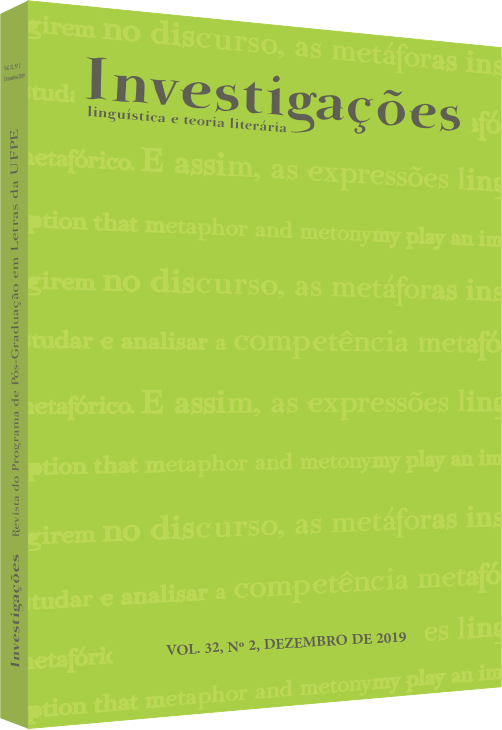Percepções sociolinguísticas de estudantes universitários em relação ao uso do pronome tu
DOI:
https://doi.org/10.51359/2175-294x.2019.241737Keywords:
sociolinguistics, variation, evaluation, pronoun tu.Abstract
In order to analyze the linguistic evaluation regardingthe use of the pronoun tu,we measure what collegestudentsfrom the wild of Alagoasthink about its use. We used the Theory of Linguistic Variation (LABOV, 2008[1972]) and adopted a direct approach through the application of a sociolinguistic attitude test. Students' perceptions indicate that there is no negative evaluation of the use of tu, but an association between their production and greater proximity/intimacy between the interlocutors, revealing that tu is used in studentcommunities, being associated with the diatopic variation and the relationship between the interlocutors.References
ARAÚJO, A.; MENDONÇA, J. Atitudes linguísticas de universitários em relação às formas pronominais a gente e tu. Revista Tabuleiro de Letras. Vol. 12, n. 3, 2018, p. 128-144.
BECHARA, E. Moderna gramática portuguesa. Rio de Janeiro: Lucerna, 2008.
CAMPBELL-KIBLER, K. The nature of sociolinguistic perception. Language Variation and Change, 21, p. 135-156, 2009.
COUTO, L.; LOPES, C. (Org.). As formas de tratamento em português e em espanhol: variação, mudança e funções conversacionais. Niterói: Editora da UFF, 2011.
CUNHA, C.; CINTRA, L. Nova gramática do português contemporâneo. Rio de Janeiro: 2008.
FERNÁNDEZ, S.; DÍAZ, S. Investigación cuantitativa y cualitativa. 2002. Disponível em: http://www.fisterra.com/mbe/investiga/cuanti_cuali/cuanti_cuali2.pdf. Acesso em 18 jun. 2017.
Garrett, P.; Coupland, N.; Williams. A. Investigating language attitudes: social meanings of dialect, ethnicity and performance. UNIVERSITY OF WALES PRESS CARDIFF , 2003.
LABOV, W. Padrões sociolinguísticos. São Paulo: Parábola Editorial, 2008 [1972].
LOPES, C. R. S. O quadro dos pronomes pessoais: descompasso entre pesquisa e ensino. Rio de Janeiro: Matraga, v. 19, n. 30, p. 116-141, jan./jun. 2012.
LOPES, C.; MARCOTULIO, L.; OLIVEIRA, L. A atuação dos papeis sociais na mudança no sistema de tratamento no português brasileiro: análise de cartas pessoais (1870-1979). Estudos de linguística galega. Volume especial I, 2018, p. 29-44.
MARTINS, M. et al. Para um panorama sócio-diacrônico das formas de tratamento na função de sujeito na região Nordeste. LaborHistórico. Rio de Janeiro, 1(1), 2015, p. 26-48.
SCHERRE, M. et al. Variação dos pronomes “tu” e “você”. In: MARTINS, M. A.; ABRAÇADO, J. (Orgs.). Mapeamento sociolinguístico do português brasileiro. São Paulo: Contexto, 2015, p. 133-172.
SILVA, S. A variação pronominal de segunda pessoa do singular em Coité do Nóia /AL. 2019. Dissertação (Mestrado em Linguística e Literatura) - Universidade Federal de Alagoas. 2019.
SILVA, S.; VITÓRIO, E. A variação você e cê no sertão alagoano. Revista Leitura. V. 2, n. 59 – Maceió – Jul./Dez, 2017, p. 122-142.
VITÓRIO, E. A variação tu e você em Maceió, Alagoas. Todas as Letras, São Paulo, v. 20, n. 2, p. 85-99, maio/ago. 2018
VITÓRIO, E. A língua usada no sertão alagoano: constituição da amostra. Trabalho apresentado no III Estudos em Linguagem do Sertão. Delmiro Gouveia, jun. 2017.
WEINREICH, U.; LABOV, W.; HERZOG, M. Fundamentos empíricos para uma teoria da mudança linguística. São Paulo: Parábola Editorial, 2006[1978].
Downloads
Published
How to Cite
Issue
Section
License
Copyright (c) 2019 Elyne Giselle de Santana Lima Aguiar Vitório

This work is licensed under a Creative Commons Attribution 4.0 International License.
Authors who publish with Revista Investigações agree to the following terms:
Authors retain copyright and grant the journal right of first publication with the work simultaneously licensed under the Creative Commons Attribution 4.0 International (CC BY 4.0) license that allows others to share the work with an acknowledgement of the work's authorship and initial publication in this journal.
Authors are able to enter into separate, additional contractual arrangements for the non-exclusive distribution of the journal's published version of the work (e.g., post it to an institutional repository or publish it in a book), with an acknowledgement of its initial publication in this journal.
You are free to:
Share — copy and redistribute the material in any medium or format for any purpose, even commercially.
Adapt — remix, transform, and build upon the material for any purpose, even commercially.
The licensor cannot revoke these freedoms as long as you follow the license terms.
Under the following terms:
Attribution — You must give appropriate credit , provide a link to the license, and indicate if changes were made . You may do so in any reasonable manner, but not in any way that suggests the licensor endorses you or your use.
No additional restrictions — You may not apply legal terms or technological measures that legally restrict others from doing anything the license permits.

